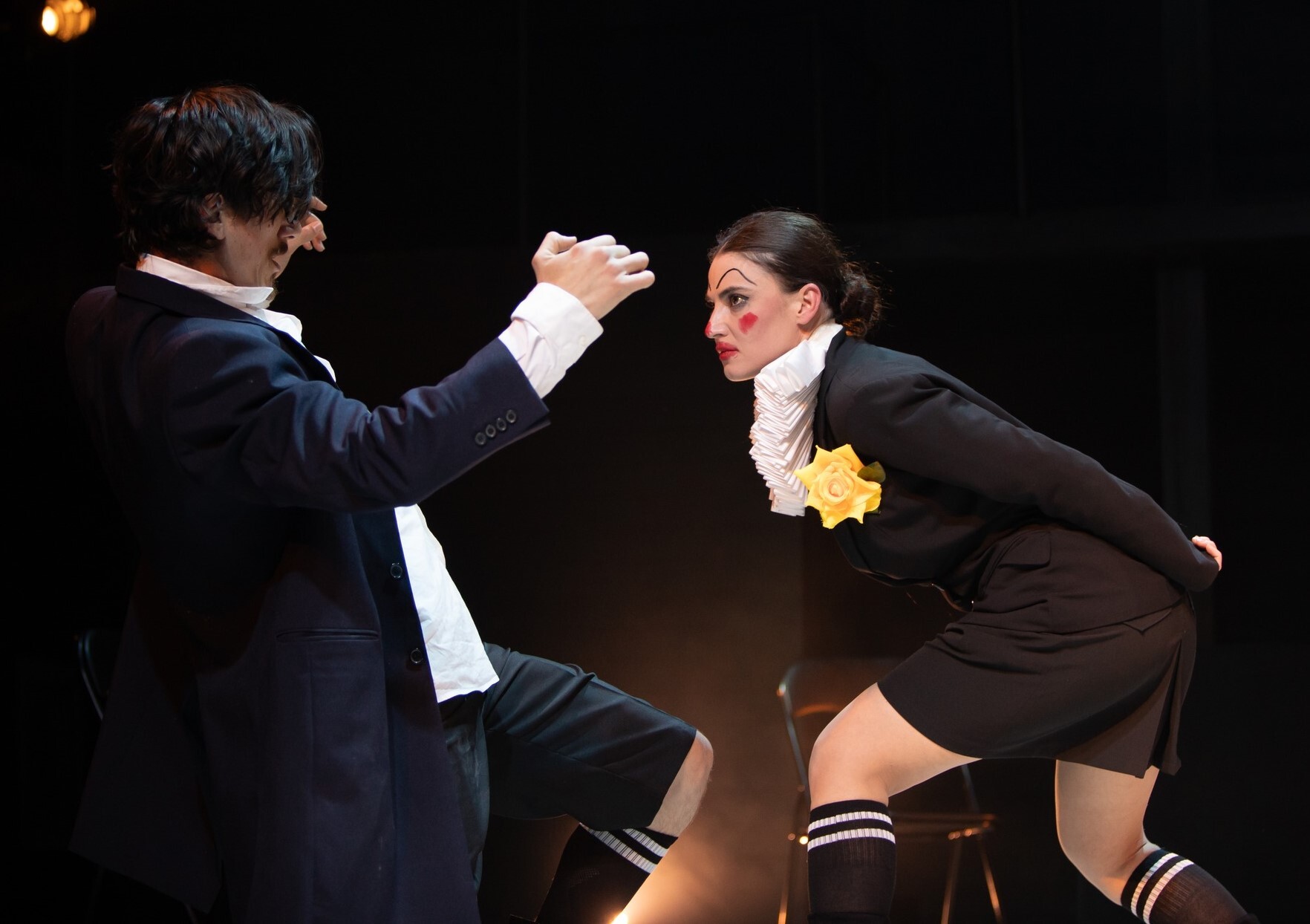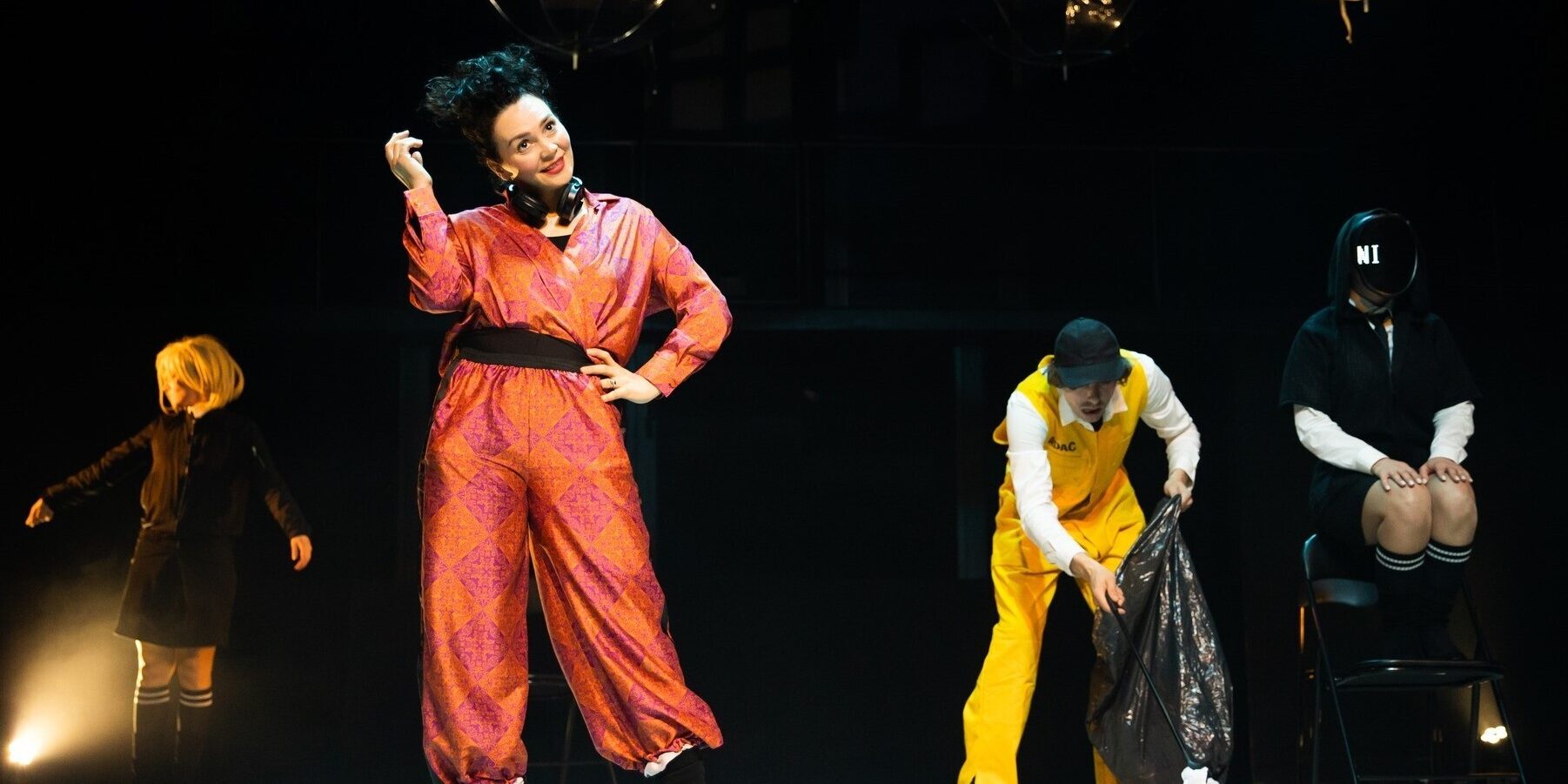National Experimental Theater “Kujtim Spahivogli” and Pristina’s Qendra Multimedia, premiere 28th April 2023
In 2019 in Kosovo, a Roma woman – a refugee who had brutally returned from Belgium a few weeks prior and was currently attempting to fit into the new culture – was subject to a violent assault.
Playwright Jeton Neziraj brings this story to life on stage. He confronts us with the fact that we are the aggressors – and he knows how to be harsh with aggressors. Racism and intolerance of the majority against minority groups are not new topics for Neziraj; some of his best works address this fact, and he frequently chooses to speak for the defenceless and attack the aggressor in his writing (sometimes with the same force they might use), using his work as a mirror to reflect their acts.
Gadjo is the Roma term for non-Roma people (and sometimes also for Roma who do not live within the Roma culture), to this Neziraj has added the phrase “the young Europeans.”
Blerta Neziraj, the show’s director and Jeton Neziraj’s regular collaborator, places five actors on stage. The Roma woman is played by Edona Reshitaj and the other four actors play the Gadjos. We experience events through the eyes of the Gadjos at times, and through the eyes of the Roma woman at others.
Mentor Berisha’s visual concept and scenography creates strong images, while Blagoj Micevski, the costume designer, dresses the Gadjos in stark black and white. The actors only need to put on a jacket or another item of clothing to switch to a new character. In contrast, the Roma woman dresses in light colours from the moment she arrives in Kosovo.
The young Europeans of the play’s title are the youth of Kosovo, Europe’s newest country and the country with the youngest average age in the continent. A video of the Republic of Kosovo advertising this fact is shown to us on the smartphone of one of the actresses. Smartphones and social media platforms play an essential role in the show. In first scene, the actors do not even talk – they simply sit with their heads down, staring at their smartphones.
And when they start talking, their language is vulgar, aggressive, offensive, and superficial. They spout theories that, deep below, Kosovo is stuffed with gold while Albania is filled with oil. The play is highly critical of media. The language of these young people echoes the logic of social media, a logic of thought where facts are not important, which appears to arise from the rapid, uncontrollable way in which news is distributed. The media does not have time to investigate the news and, desperate for clicks and views, they releases fake news stories, like one about a man dressed as a woman kidnapping children in Kosovo.
The description of this individual given by two young men – played by Rafael Hoxhaj and Blend Sadiku – to the journalist, played by Juli Emiri, is grotesque and fantastical, the coat of the person into which the children vanish changes color as they speak, wings appear on her back, they are both shapeless and a shape-shifter…
The radio commentators make equally ridiculous arguments, claiming that Kosovar young people are free from vices and violence and that phrases like racism, gender-based violence, etc are merely terms that have been imported from the West and do not fit into our society. “We are not racists. Ah, yes, there is some racism toward the “magjupi” (an offensive term for the Roma), but it is innocent, harmless racism”, explains one of the commentators, played by Verona Koxha.
The Roma woman and the Gadjos have little actual interaction, and on the rare times when they do, she is violated. The persecution of the Roma woman, which began in Belgium continues in Kosovo, where she has been repatriated (even though she does not know the language or the country – her ‘repatriation’ seems more like deportation in this case).

Gadjo (the young europeans)
Neziraj’s play demonstrates how the persecution committed by the older Europeans is more institutionalized, whilst that of the younger Europeans is more deinstitutionalized. A waiter refuses to serve the Roma woman and cleans the table where she was sitting, then exclaims that he personally will protect the place, along with the “Association of United Waiters of Kosovo”.
Throughout, the Roma woman appears to be oblivious of the racism aimed toward her. While waiting for the bus, she misinterprets a stranger’s stares as flirting, until he approaches her and instead of flirting with her, he insults her.
There are times, though, when it is difficult to misinterpret the racism directed at her, and in such cases, she puts on her headphones and doesn’t listen. The Gadjos make it seem as though she is responsible for everything that is wrong with society. The violence escalates until she is physically assaulted.
When the Roma woman is even denied the water she begs at the police station, Neziraj decides to transport us somewhere else – to let us hear the woman’s dream of sailing on the water on a boat with her grandmother.
As the play comes to an end, the performers sing a Roma song that sounds like an anthem (Edona Reshitaj has a fantastic voice). This song is a hymn for all those who have endured atrocities committed against them and still do. Jindrich Cizek, the show’s composer, does a superb job in this respect. The music is a crucial component of the show.
The characters in Neziraj’s world are distinct and constant. At one point on stage, the group of Young Europeans sing: “Killers, we are the future killers, our fists are the flag of this country.” and the feeling experienced by the audience is deeply unpleasant and uncomfortable.
This is not a gentle show. Jeton and Blerta Neziraj do not want to touch you with this show (despite the fact that it is a very emotive show), they want to hit you with it instead. With this hit, they demand a reaction; to get into the trenches. The rise of fascism is with us, around us; what will we do? How will we react? Will we resist it or will we let it win over us?
Credits:
Written by Jeton Neziraj// Director: Blerta Neziraj//Composer: Jindrich Cizek//Costume design: Blagoj Micevski// Visual concept and Scenography: Mentor Berisha// Realization of scenography: Beqo Nanaj//Lights: Yann Perregaux, Mursel Bekteshi//
Further reading: interview with Blerta Neziraj: “As a female director in Kosovo, you have to fight constantly”
Flamur Dardeshi is a freelance writer based in Tirana. He has contributed in the areas of translation, analysis, and poetry. His main fields of interest are literature, cinematography, and theatre.








